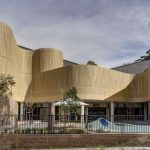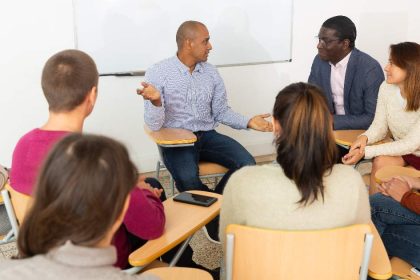A new website spearheaded by Australian Catholic University (ACU) will provide evidence-based information and resources for educators and families to help teach and protect children aged birth to eight years in today’s digital world.
Lead researcher Professor Suzy Edwards, of ACU’s Institute for Learning Sciences and Teacher Education, says the new website is a go-to hub for early learning services and educators.
“This website has free-to-access resources that take the guess work out when it comes to best practice to keep children actively and safely engaged, entertained, and educated in the digital world,” says Edwards.
“The resources will benefit children, their families, and educators through easy-to-use and evidence-based exemplar practices children and adults can try at home or in their early learning services.”
The comprehensive website is the result of a landmark four-year Young Children in Digital Society research
project led by ACU in collaboration with education and health experts from Curtin University, Deakin University, Monash University, La Trobe University, and the University of Canberra.

Building social skills with peace of mind
Young Children in Digital Society was created following research into the four areas of technology use outlined in the Early Childhood Australia (ECA) Statement on Young Children and Digital Technologies – relationships, health and wellbeing, citizenship, and play and pedagogy – features 40 new resources for educators and families including:
- Articles on topics including how to use technology to build relationships and social skills, ways digital technologies can support peer-to-peer interactions between children, and tips on how digital technologies can be used to spark physical activity
- Videos to support families to safely enjoy digital content together including a segment on iconic Australian TV show Play School that supports children in building early understandings about safely communicating with people they know in real life online, as well as ways to transition from technology to non-digital activities, and how to link digital content to children’s interests
- Webinars, interactive modules, picture books, and animations for children, parents and guardians, and early childhood educators about online safety.
Edwards told EducationDaily that the resource has been developed in collaboration with children, families, and educators as end-users, with expert input from leading organisations in online safety and early childhood education, and contributions from leading researchers in digital education.
“The resources are designed to support children, families, and educators with different aspects of digital safety, such as ensuring active supervision of children online, helping children understand the importance of communicating only with people they know in-person, and building young children’s understanding of the internet,” she says.
Informed by expert collaboration
ECA, the eSafety Commissioner, ABC Kids, Australian Federal Police, Raising Children Network, the Alannah & Madeline Foundation and Deeper Richer were partners on the Australian Research Council-funded study, which led to the creation of the new Young Children in Digital Society website.
We Belong Family Day Care, Playgroup Western Australia, Lady Gowrie Tasmania, Pope Road Kindergarten, Berwick and District Woodworkers Club, and C & K Childcare & Kindergarten were also involved in the project.
“The extent of collaboration was critical because the benefits and challenges of digital technologies for young children require understanding the related complexities of how children play and learn with digital technologies,” Edwards told EducationDaily.
“Benefits include opportunities for communicating and discussion with peers and adults about quality digital media and games that can help children with social skills such as turn taking and engaging in rich conversations that promote language development.
“Challenges include ensuring children have a balance of digital technologies with physical activity, ensuring children are safe online and using digital technologies in ways that facilitate strong peer to peer, and child to adult relationships.
Edwards says the benefits and challenges “often occur at the same time, for example, the benefit of engaging with a well-designed digital game that stimulates engaging conversations between and adult, still brings with it the challenge of how to help children transition from an enjoyable digital experience into a non-digital activity, such as going for walk”.
“We needed a team that had depth and breadth of scale in diverse areas of early childhood education and care and digital learning. With such a large-scale collaboration the challenge was to develop and maintain a shared commitment to developing knowledge about how best to support children and their adults with optimal digital learning across multiple aspects of their lives, such as their relationships, health and wellbeing, online safety, and play and learning.”
Empowering educators to help parents
Australia’s eSafety Commissioner Julie Inman Grant says children were engaging with digital technologies from a young age and educators needed to be empowered to help parents and carers navigate online challenges.
“This groundbreaking research project will provide an additional comprehensive resource for educators, parents and broader family members to ensure that children are harnessing the benefits of the digital world while minimising the risks,” she says.
“Technology platforms were not built in the best interests of the child so it’s up to all of us to ensure that children’s best interests are realised when they are online.”
Edwards told EducationDaily that protecting children online is increasingly important because “digital technologies and the internet are critical to how people today interact, communicate, work, learn and play”.
“Young children are part of the world in which people use digital technologies. Thinking about young children in digital world means understanding how children interact with technologies, but also how adults model digital technology use and use technologies on behalf of young children.
“Young children can experience inappropriate content online, they may be contacted by people unknown to them, they can accidently engage with malware or viruses through pop-ups and might experience cyber-bullying.”
She says the new website resource aims to help adults support children with online safety – something she says can be achieved through “active supervision of children using the internet at all times, helping children to understand that the internet is a network that people use to share information and to communicate, and teaching children to also ask a trusted adult for help”.
Helping children enjoy a safer digital experience
Edwards says the user-friendly website was designed with children’s best interests at heart.
“We know young children and their families live in a digital world and we intend for children to use digital technologies in a safe, effective, and informed way. To do this, service providers, families and educators need access to evidence-based advice and resources – and that is exactly what we’ve delivered,” she says.
“Parents can look forward to resources that provide ideas, tips or strategies for how to use digital technologies well and safely with their children. There are animations and books parents can use to help start the conversations about online safety at home. There are strategies for helping children with calm transitions from using devices into non-digital activities, such as playing with toys or enjoying physical activity with their families.”
For teachers, Edwards says “the resources address known areas of importance for children’s early learning, including their relationships with others, health and wellbeing, citizenship, and play and learning”.
“Educators can identify areas of learning in which they are interested and find multiple resources to use in practice with children. This includes ideas for building on children’s media interests for pretend play, helping children learn about the internet and online safety, and integrating digital technologies with physical activity. All the resources are mapped to the Early Years Learning Framework and the National Principles for Child Safe Organisations.”
With so much talk about social media bans and restrictions for young people, Edwards believes the sustainable solution is underpinned by better education.
“Pre-school aged children will grow into primary school aged children, and teenagers and young people. Because social media is an important part of life for young people and adults, children need opportunities from an early age to grow into their understandings of digital technologies and the internet with trusted adults.
“Parents of pre-schoolers already pay attention to important areas of their children’s wellbeing, such as sun safety and water safety, keeping children safe around traffic or ensuring children are well supervised around pets. Children learn from their trusted adults about how to navigate the world. Early digital education is no exception.”








